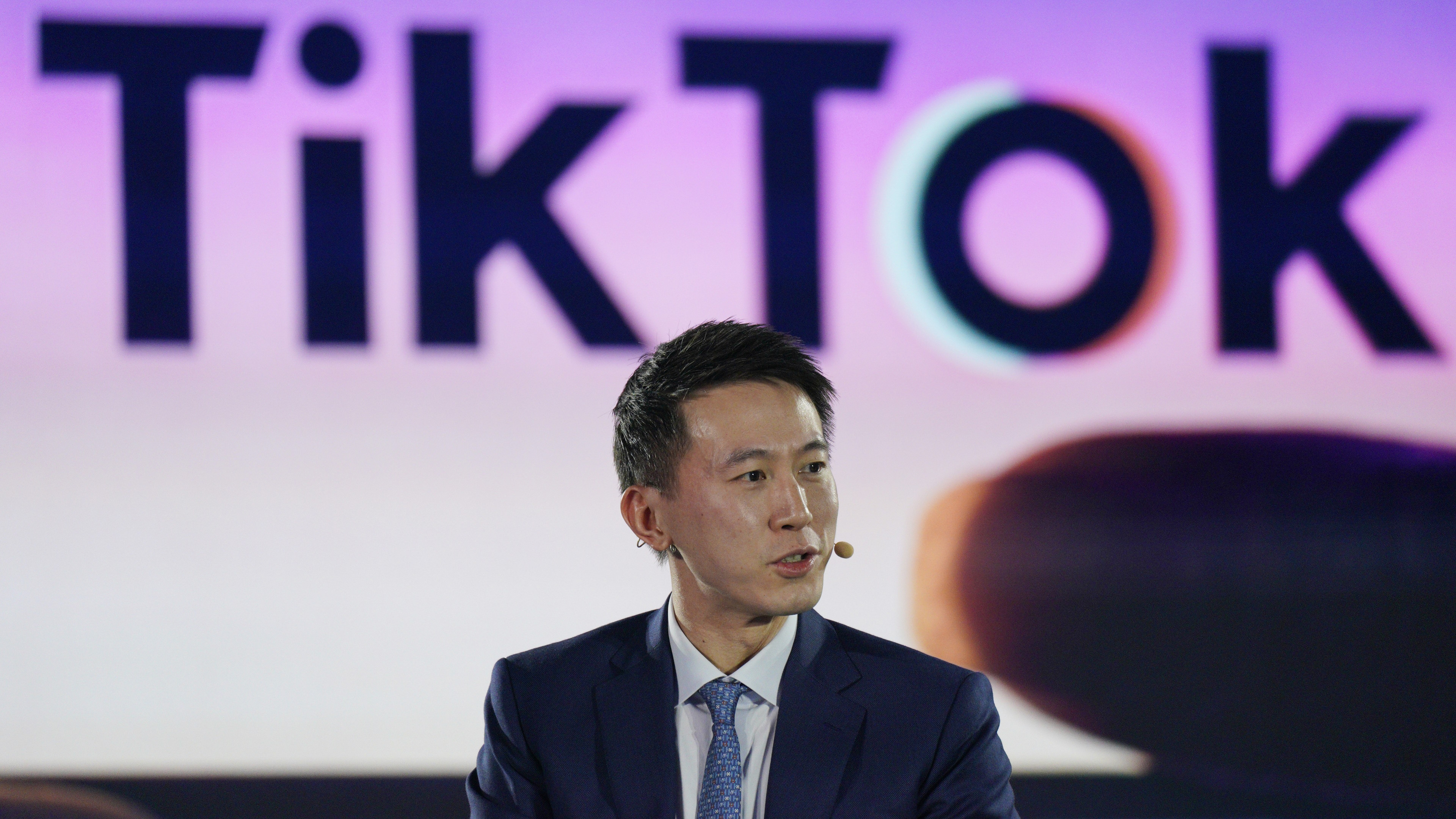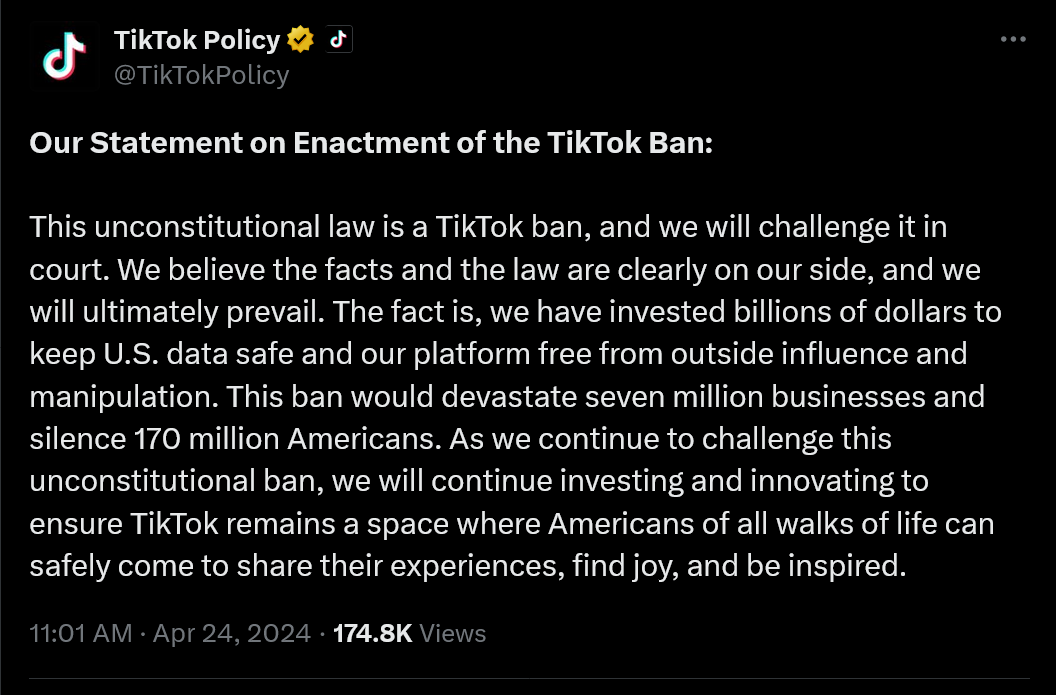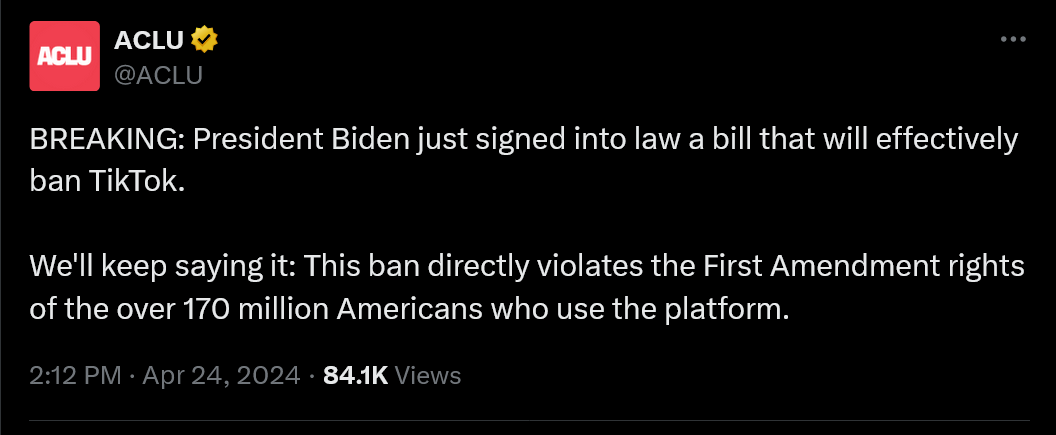
TikTok CEO Shou Zi Chew says the company will challenge a recently-signed US law requiring the platform be sold off by Chinese parent company ByteDance or face a block in the US, and warned that the true goal of legislators is not to force a change of ownership but simply to ban access to the service outright.
After an extended period of wrangling, the US Congress passed a bill calling for TikTok's sale or block in March, sending it to the Senate, which voted to pass the bill on April 22. One day later, US President Joe Biden signed the bill into law.
Known formally as the Protecting Americans From Foreign Adversary Controlled Applications Act and rolled into the much larger HR 815, a bill primarily about providing military aid to Ukraine, Israel, and Taiwan, the law essentially forbids the distribution, maintenance, or updating of an application under the control of a "foreign adversary," in this case China, and more specifically ByteDance and TikTok.
In a statement posted to Twitter, TikTok said the new law is unconstitutional and confirmed that it will challenge it in US courts. "The fact is, we have invested billions of dollars to keep US data safe and our platform free from outside influence and manipulation," TikTok said. "This ban would devastate seven million businesses and silence 170 million Americans.
"As we continue to challenge this unconstitutional ban, we will continue investing and innovating to ensure TikTok remains a space where Americans of all walks of life can safely come to share their experiences, find joy, and be inspired."

In a TikTok video, Shou expressed similar sentiments and also claimed that the real goal of some US lawmakers is not to disconnect China from TikTok, but nothing less than an outright ban on the platform, presumably a more alarming potential outcome for people who use it.
"That will take TikTok away from you and 170 million Americans who find community and connection on our platform," Shou said.
"This is actually ironic, because the freedom of expression on TikTok reflects the same American values that make the United States a beacon of freedom. TikTok gives everyday Americans a powerful way to be seen and heard, and that's why so many people have made TikTok part of their daily lives. Rest assured, we aren't going anywhere. We are confident and we will keep fighting for your rights in the courts."
@tiktok Response to TikTok Ban Bill
♬ original sound - TikTok
It's ironic to hear the CEO of a Chinese company glorifying the virtues of American freedom of expression; it's also ironic that the US presents itself as hellbent on protecting American privacy from the predations of TikTok while allowing Twitter and Facebook to run wild. Privacy concerns are valid but also almost entirely moot in a world where the tendrils of social media have pried into virtually every aspect of our lives, and while I certainly don't consider TikTok a force of pure altruism, efforts to shut it down are clearly driven by politics above all else.
None of which makes Shou wrong: Organizations including the ACLU, the Electronic Frontier Foundation, Fight for the Future, and PEN America have spoken out against the law, saying it will "violate the First Amendment rights of Americans across the country" and "set an alarming global precedent for excessive government control over social media platforms."

Despite the president signing the bill into law, what happens next remains to be seen. ByteDance has a year to offload TikTok, and assuming it follows through on its promise to take the whole thing to court, that'll delay a resolution even further. The potential election of Donald Trump to the US presidency could also complicate matters: Despite trying to impose his own ban on TikTok in 2020, Trump has now come out strongly against the proposal and might try to undo, or at least weaken, this new law.
China's government, meanwhile, has expressed strong opposition to a forced sale of TikTok, and more specifically the algorithms that have driven its success. For the moment, that leaves ByteDance little room to maneuver, but it needs to do something: Other Western countries including the UK, Australia, and Canada are considering TikTok bans of their own, and will almost certainly follow along whatever path the US decides to take.







